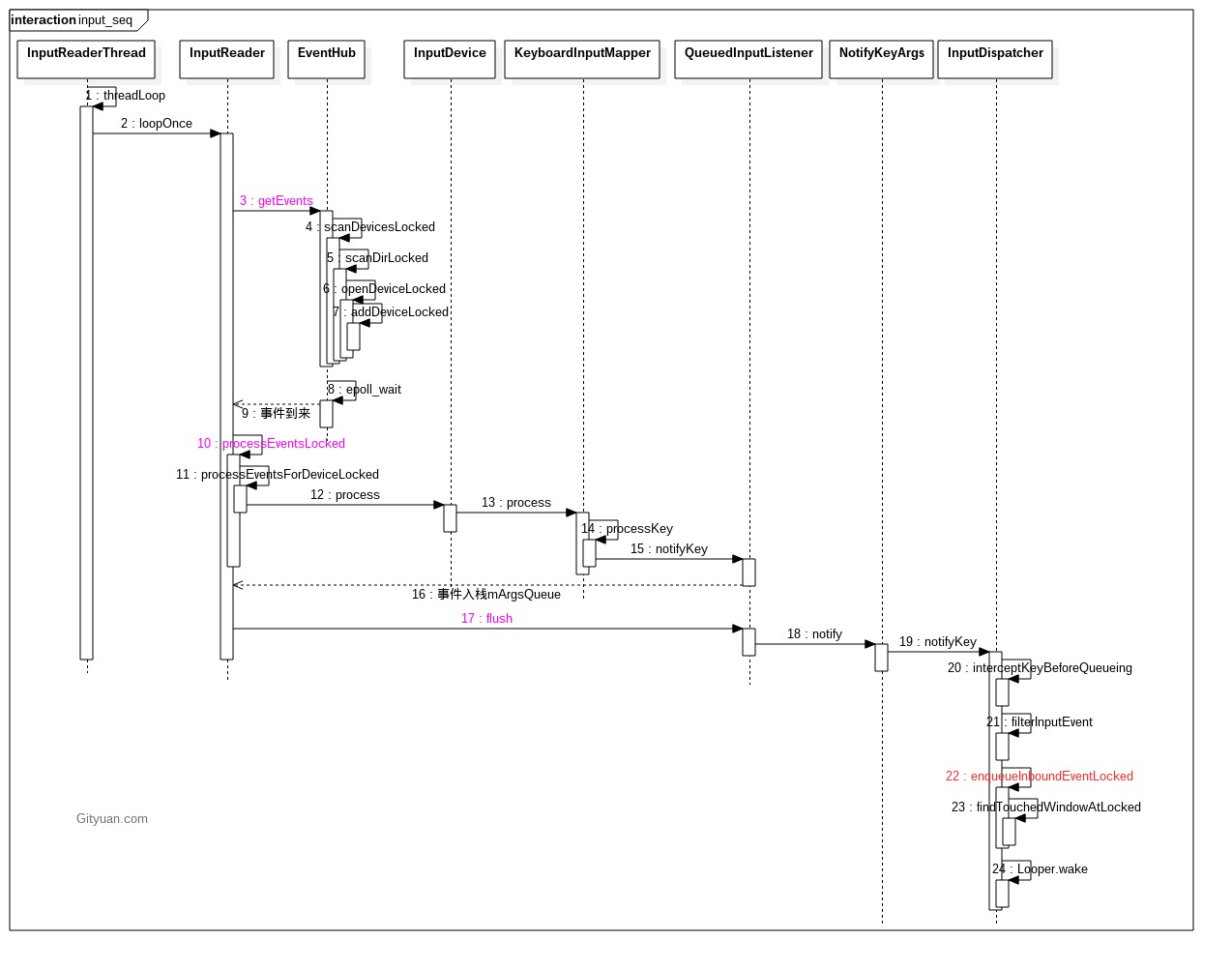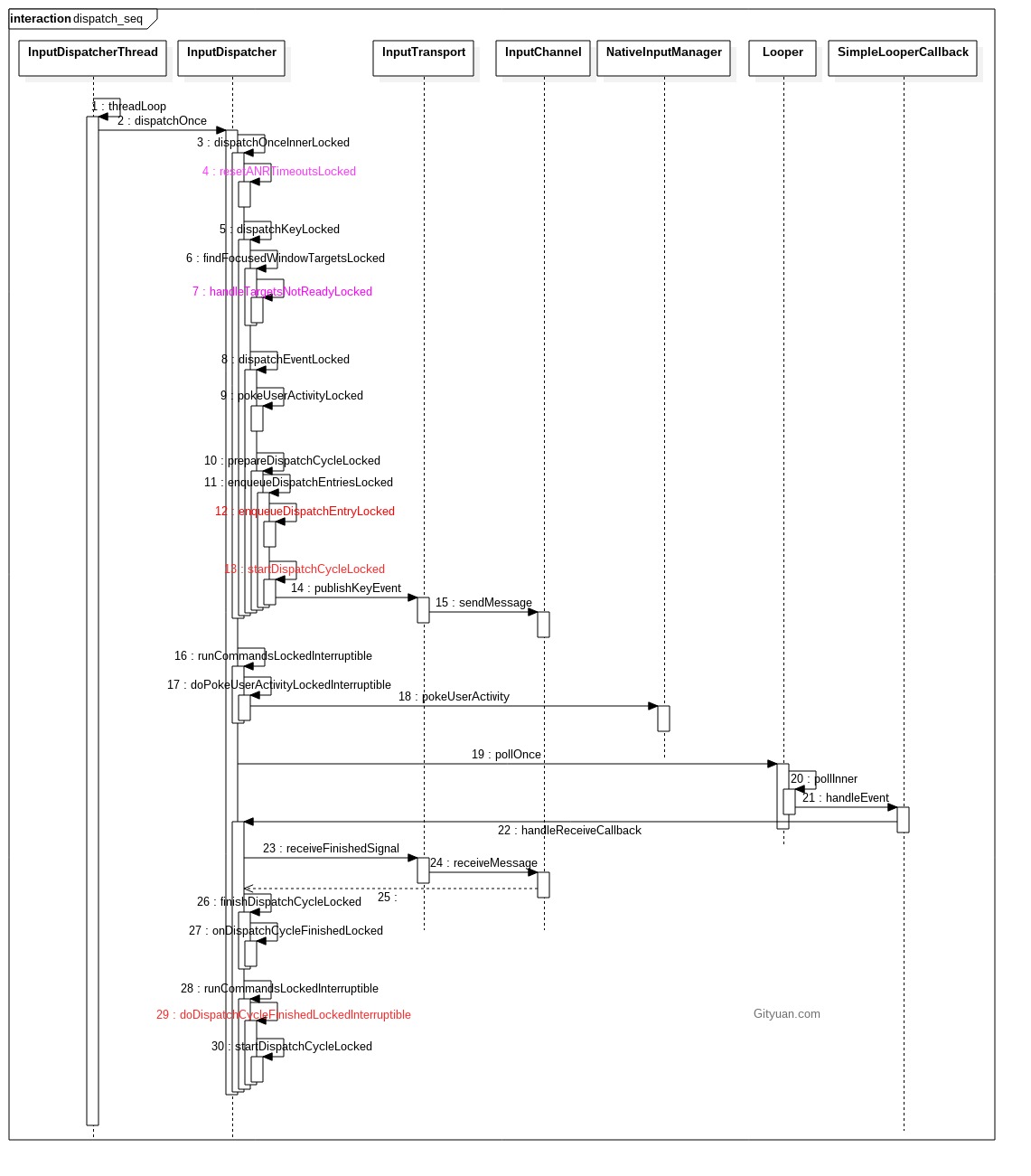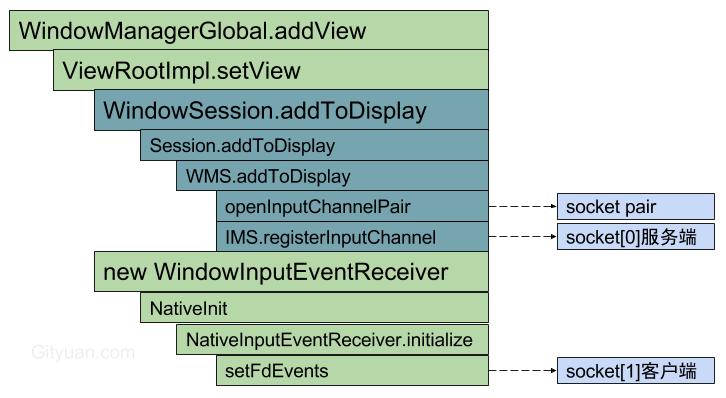touchEventNative
原理图

static const char *WAKE_LOCK_ID = "KeyEvents";
static const char *DEVICE_PATH = "/dev/input";
SystemServer
startOtherServices
private void startOtherServices() {
inputManager = new InputManagerService(context);
wm = WindowManagerService.main(context, inputManager,
mFactoryTestMode != FactoryTest.FACTORY_TEST_LOW_LEVEL,
!mFirstBoot, mOnlyCore, new PhoneWindowManager());
ServiceManager.addService(Context.WINDOW_SERVICE, wm, /* allowIsolated= */ false,
DUMP_FLAG_PRIORITY_CRITICAL | DUMP_FLAG_PROTO);
ServiceManager.addService(Context.INPUT_SERVICE, inputManager,
/* allowIsolated= */ false, DUMP_FLAG_PRIORITY_CRITICAL);
......
inputManager.setWindowManagerCallbacks(wm.getInputMonitor());
inputManager.start();
}
InputManagerService
public class InputManagerService extends IInputManager.Stub {
public InputManagerService(Context context) {
this.mContext = context;
this.mHandler = new InputManagerHandler(DisplayThread.get().getLooper());
mPtr = nativeInit(this, mContext, mHandler.getLooper().getQueue());
}
}
start
public void start() {
Slog.i(TAG, "Starting input manager");
nativeStart(mPtr);
}
registerInputChannel
public void registerInputChannel(InputChannel inputChannel,
InputWindowHandle inputWindowHandle) {
nativeRegisterInputChannel(mPtr, inputChannel, inputWindowHandle, false);
}
frameworks/base/services/core/jni/com_android_server_input_InputManagerService.cpp
com_android_server_input_InputManagerService
nativeInit
static jlong nativeInit(JNIEnv* env, jclass /* clazz */,
jobject serviceObj, jobject contextObj, jobject messageQueueObj) {
sp<MessageQueue> messageQueue = android_os_MessageQueue_getMessageQueue(env, messageQueueObj);
NativeInputManager* im = new NativeInputManager(contextObj, serviceObj,
messageQueue->getLooper());
im->incStrong(0);
return reinterpret_cast<jlong>(im);
}
nativeStart
static void nativeStart(JNIEnv* env, jclass /* clazz */, jlong ptr) {
NativeInputManager* im = reinterpret_cast<NativeInputManager*>(ptr);
status_t result = im->getInputManager()->start();
}
nativeRegisterInputChannel
static void nativeRegisterInputChannel(JNIEnv* env, jclass /* clazz */,
jlong ptr, jobject inputChannelObj, jobject inputWindowHandleObj, jboolean monitor) {
NativeInputManager* im = reinterpret_cast<NativeInputManager*>(ptr);
status_t status = im->registerInputChannel(
env, inputChannel, inputWindowHandle, monitor);
}
frameworks/base/services/core/jni/com_android_server_input_InputManagerService.cpp
NativeInputManager
NativeInputManager::NativeInputManager(jobject contextObj,
jobject serviceObj, const sp<Looper>& looper) :
mLooper(looper), mInteractive(true) {
sp<EventHub> eventHub = new EventHub();
mInputManager = new InputManager(eventHub, this, this);
}
registerInputChannel
status_t NativeInputManager::registerInputChannel(JNIEnv* /* env */,
const sp<InputChannel>& inputChannel,
const sp<InputWindowHandle>& inputWindowHandle, bool monitor) {
ATRACE_CALL();
return mInputManager->getDispatcher()->registerInputChannel(
inputChannel, inputWindowHandle, monitor);
}
frameworks/native/services/inputflinger/InputManager.cpp
InputManager
InputManager::InputManager(
const sp<EventHubInterface>& eventHub,
const sp<InputReaderPolicyInterface>& readerPolicy,
const sp<InputDispatcherPolicyInterface>& dispatcherPolicy) {
mDispatcher = new InputDispatcher(dispatcherPolicy);
mReader = new InputReader(eventHub, readerPolicy, mDispatcher);
initialize();
}
initialize
void InputManager::initialize() {
mReaderThread = new InputReaderThread(mReader);
mDispatcherThread = new InputDispatcherThread(mDispatcher);
}
start
status_t InputManager::start() {
status_t result = mDispatcherThread->run("InputDispatcher", PRIORITY_URGENT_DISPLAY);
result = mReaderThread->run("InputReader", PRIORITY_URGENT_DISPLAY);
return OK;
}
frameworks/native/services/inputflinger/EventHub.cpp
EventHub
EventHub
EventHub::EventHub(void) : {
mEpollFd = epoll_create(EPOLL_SIZE_HINT);
mINotifyFd = inotify_init();
int result = inotify_add_watch(mINotifyFd, DEVICE_PATH, IN_DELETE | IN_CREATE);
struct epoll_event eventItem;
memset(&eventItem, 0, sizeof(eventItem));
eventItem.events = EPOLLIN;
eventItem.data.u32 = EPOLL_ID_INOTIFY;
result = epoll_ctl(mEpollFd, EPOLL_CTL_ADD, mINotifyFd, &eventItem);
int wakeFds[2];
result = pipe(wakeFds);
mWakeReadPipeFd = wakeFds[0];
mWakeWritePipeFd = wakeFds[1];
result = fcntl(mWakeReadPipeFd, F_SETFL, O_NONBLOCK);
result = fcntl(mWakeWritePipeFd, F_SETFL, O_NONBLOCK);
eventItem.data.u32 = EPOLL_ID_WAKE;
result = epoll_ctl(mEpollFd, EPOLL_CTL_ADD, mWakeReadPipeFd, &eventItem);
}
getEvents
size_t EventHub::getEvents(int timeoutMillis, RawEvent* buffer, size_t bufferSize) {
for (;;) {
// Grab the next input event.
bool deviceChanged = false;
while (mPendingEventIndex < mPendingEventCount) {
const struct epoll_event& eventItem = mPendingEventItems[mPendingEventIndex++];
if (eventItem.data.u32 == EPOLL_ID_INOTIFY) {
if (eventItem.events & EPOLLIN) {
mPendingINotify = true;
}
continue;
}
......
if (mPendingINotify && mPendingEventIndex >= mPendingEventCount) {
mPendingINotify = false;
readNotifyLocked();
}
}
int pollResult = epoll_wait(mEpollFd, mPendingEventItems, EPOLL_MAX_EVENTS, timeoutMillis);
}
readNotifyLocked
status_t EventHub::readNotifyLocked() {
res = read(mINotifyFd, event_buf, sizeof(event_buf));
}
frameworks/native/services/inputflinger/InputReader.cpp
InputReaderThread
threadLoop
bool InputReaderThread::threadLoop() {
mReader->loopOnce();
return true;
}
frameworks/native/services/inputflinger/InputReader.cpp
InputReader

InputReader::InputReader(const sp<EventHubInterface>& eventHub,
const sp<InputReaderPolicyInterface>& policy,
const sp<InputListenerInterface>& listener) :
mContext(this), mEventHub(eventHub), mPolicy(policy), {
mQueuedListener = new QueuedInputListener(listener);
}
threadLoop
bool InputReaderThread::threadLoop() {
mReader->loopOnce();
return true;
}
loopOnce
void InputReader::loopOnce() {
size_t count = mEventHub->getEvents(timeoutMillis, mEventBuffer, EVENT_BUFFER_SIZE);
if (count) {
processEventsLocked(mEventBuffer, count);
}
// Flush queued events out to the listener.
// This must happen outside of the lock because the listener could potentially call
// back into the InputReader's methods, such as getScanCodeState, or become blocked
// on another thread similarly waiting to acquire the InputReader lock thereby
// resulting in a deadlock. This situation is actually quite plausible because the
// listener is actually the input dispatcher, which calls into the window manager,
// which occasionally calls into the input reader.
mQueuedListener->flush();
}
frameworks/native/services/inputflinger/InputListener.cpp
QueuedInputListener
flush
void QueuedInputListener::flush() {
size_t count = mArgsQueue.size();
for (size_t i = 0; i < count; i++) {
NotifyArgs* args = mArgsQueue[i];
args->notify(mInnerListener);
delete args;
}
mArgsQueue.clear();
}
NotifyMotionArgs
notify
void NotifyMotionArgs::notify(const sp<InputListenerInterface>& listener) const {
listener->notifyMotion(this);
}
frameworks/native/services/inputflinger/InputDispatcher.cpp
InputDispatcher
threadLoop
bool InputDispatcherThread::threadLoop() {
mDispatcher->dispatchOnce();
return true;
}
dispatchOnce
void InputDispatcher::dispatchOnce() {
// Run a dispatch loop if there are no pending commands.
// The dispatch loop might enqueue commands to run afterwards.
if (!haveCommandsLocked()) {
dispatchOnceInnerLocked(&nextWakeupTime);
}
// Wait for callback or timeout or wake. (make sure we round up, not down)
nsecs_t currentTime = now();
int timeoutMillis = toMillisecondTimeoutDelay(currentTime, nextWakeupTime);
mLooper->pollOnce(timeoutMillis);//registerInputChannel时通过Looper.wake()唤醒线程
}
notifyMotion
void InputDispatcher::notifyMotion(const NotifyMotionArgs* args) {
if (needWake) {
mLooper->wake();
}
}
dispatchOnceInnerLocked
void InputDispatcher::dispatchOnceInnerLocked(nsecs_t* nextWakeupTime) {
case EventEntry::TYPE_MOTION: {
MotionEntry* typedEntry = static_cast<MotionEntry*>(mPendingEvent);
if (dropReason == DROP_REASON_NOT_DROPPED && isAppSwitchDue) {
dropReason = DROP_REASON_APP_SWITCH;
}
if (dropReason == DROP_REASON_NOT_DROPPED
&& isStaleEventLocked(currentTime, typedEntry)) {
dropReason = DROP_REASON_STALE;
}
if (dropReason == DROP_REASON_NOT_DROPPED && mNextUnblockedEvent) {
dropReason = DROP_REASON_BLOCKED;
}
done = dispatchMotionLocked(currentTime, typedEntry,
&dropReason, nextWakeupTime);
break;
}
dispatchMotionLocked
bool InputDispatcher::dispatchMotionLocked(
nsecs_t currentTime, MotionEntry* entry, DropReason* dropReason, nsecs_t* nextWakeupTime) {
dispatchEventLocked(currentTime, entry, inputTargets);
return true;
}
dispatchEventLocked
void InputDispatcher::dispatchEventLocked(nsecs_t currentTime,
EventEntry* eventEntry, const Vector<InputTarget>& inputTargets) {
for (size_t i = 0; i < inputTargets.size(); i++) {
const InputTarget& inputTarget = inputTargets.itemAt(i);
ssize_t connectionIndex = getConnectionIndexLocked(inputTarget.inputChannel);
if (connectionIndex >= 0) {
sp<Connection> connection = mConnectionsByFd.valueAt(connectionIndex);
prepareDispatchCycleLocked(currentTime, connection, eventEntry, &inputTarget);
}
}
prepareDispatchCycleLocked
void InputDispatcher::prepareDispatchCycleLocked(nsecs_t currentTime,
const sp<Connection>& connection, EventEntry* eventEntry, const InputTarget* inputTarget) {
enqueueDispatchEntriesLocked(currentTime, connection, splitMotionEntry, inputTarget);
}
enqueueDispatchEntriesLocked
void InputDispatcher::enqueueDispatchEntriesLocked(nsecs_t currentTime,
const sp<Connection>& connection, EventEntry* eventEntry, const InputTarget* inputTarget) {
bool wasEmpty = connection->outboundQueue.isEmpty();
......
// If the outbound queue was previously empty, start the dispatch cycle going.
if (wasEmpty && !connection->outboundQueue.isEmpty()) {
startDispatchCycleLocked(currentTime, connection);
}
}
startDispatchCycleLocked
void InputDispatcher::startDispatchCycleLocked(nsecs_t currentTime,
const sp<Connection>& connection) {
EventEntry* eventEntry = dispatchEntry->eventEntry;
switch (eventEntry->type) {
case EventEntry::TYPE_KEY: {
KeyEntry* keyEntry = static_cast<KeyEntry*>(eventEntry);
// Publish the key event.
status = connection->inputPublisher.publishKeyEvent(dispatchEntry->seq,
keyEntry->deviceId, keyEntry->source,
dispatchEntry->resolvedAction, dispatchEntry->resolvedFlags,
keyEntry->keyCode, keyEntry->scanCode,
keyEntry->metaState, keyEntry->repeatCount, keyEntry->downTime,
keyEntry->eventTime);
break;
}
case EventEntry::TYPE_MOTION: {
// Publish the motion event.
status = connection->inputPublisher.publishMotionEvent(dispatchEntry->seq,
motionEntry->deviceId, motionEntry->source, motionEntry->displayId,
dispatchEntry->resolvedAction, motionEntry->actionButton,
dispatchEntry->resolvedFlags, motionEntry->edgeFlags,
motionEntry->metaState, motionEntry->buttonState,
xOffset, yOffset, motionEntry->xPrecision, motionEntry->yPrecision,
motionEntry->downTime, motionEntry->eventTime,
motionEntry->pointerCount, motionEntry->pointerProperties,
usingCoords);
break;
}
handleReceiveCallback
int InputDispatcher::handleReceiveCallback(int fd, int events, void* data) {
InputDispatcher* d = static_cast<InputDispatcher*>(data);
ssize_t connectionIndex = d->mConnectionsByFd.indexOfKey(fd);
sp<Connection> connection = d->mConnectionsByFd.valueAt(connectionIndex);
if (!(events & (ALOOPER_EVENT_ERROR | ALOOPER_EVENT_HANGUP))) {
if (!(events & ALOOPER_EVENT_INPUT)) {//仅仅对ALOOPER_EVENT_INPUT事件类型进行处理
ALOGW("channel '%s' ~ Received spurious callback for unhandled poll event. "
"events=0x%x", connection->getInputChannelName().c_str(), events);
return 1;
}
nsecs_t currentTime = now();
bool gotOne = false;
status_t status;
for (;;) {
uint32_t seq;
bool handled;
status = connection->inputPublisher.receiveFinishedSignal(&seq, &handled);
if (status) {
break;
}
d->finishDispatchCycleLocked(currentTime, connection, seq, handled);
gotOne = true;
}
if (gotOne) {
d->runCommandsLockedInterruptible();
if (status == WOULD_BLOCK) {
return 1;
}
}
}

-
Input系统—InputReader线程:通过EventHub从/dev/input节点获取事件,转换成EventEntry事件加入到InputDispatcher的mInboundQueue。
-
Input系统—InputDispatcher线程:从mInboundQueue队列取出事件,转换成DispatchEntry事件加入到connection的outboundQueue队列。再然后开始处理分发事件,取出outbound队列,放入waitQueue.
-
Input系统—UI线程
:创建socket pair,分别位于”InputDispatcher”线程和focused窗口所在进程的UI主线程,可相互通信。
- UI主线程:通过setFdEvents(), 监听socket客户端,收到消息后回调NativeInputEventReceiver();【见小节2.1】
- “InputDispatcher”线程: 通过IMS.registerInputChannel(),监听socket服务端,收到消息后回调handleReceiveCallback;【见小节3.1】
前面文章都是介绍了两个线程InputReader和InputDispatcher的工作过程。在InputDispatcher的过程讲到 调用InputChanel通过socket与远程进程通信,本文便展开讲解这个socket是如何建立的。
对于InputReader和InputDispatcher都是运行在system_server进程; 用户点击的界面往往可能是某一个app,而每个app一般地都运行在自己的进程,这里就涉及到跨进程通信,app进程是如何与system进程建立通信。
frameworks/native/libs/input/InputTransport.cpp
InputPublisher
publishMotionEvent
status_t InputPublisher::publishMotionEvent(
uint32_t seq,...... {
return mChannel->sendMessage(&msg);
}
InputConsumer
sendFinishedSignal
status_t InputConsumer::sendFinishedSignal(uint32_t seq, bool handled) {
return sendUnchainedFinishedSignal(seq, handled);
}
sendUnchainedFinishedSignal
status_t InputConsumer::sendUnchainedFinishedSignal(uint32_t seq, bool handled) {
InputMessage msg;
msg.header.type = InputMessage::TYPE_FINISHED;
msg.body.finished.seq = seq;
msg.body.finished.handled = handled;
return mChannel->sendMessage(&msg);
}
InputChannel(两个Socket实现双向监听)
sendMessage
status_t InputChannel::sendMessage(const InputMessage* msg) {
size_t msgLength = msg->size();
ssize_t nWrite;
do {
nWrite = ::send(mFd, msg, msgLength, MSG_DONTWAIT | MSG_NOSIGNAL);
} while (nWrite == -1 && errno == EINTR);
Socket/Channel SystemServer进程
[-> WindowManagerService.java]
public int addWindow(Session session, IWindow client, int seq, WindowManager.LayoutParams attrs, int viewVisibility, int displayId, Rect outContentInsets, Rect outStableInsets, Rect outOutsets, InputChannel outInputChannel) {
inputChannels数组:
- inputChannels[0]所对应的InputChannel名称的后缀为
(server); - inputChannels[1]所对应的InputChannel名称的后缀为
(client);
其中:
- 服务端inputChannels[0]保存到WindowState的mInputChannel;
- 客户端inputChannels[1]传递给outInputChannel,最终传递给ViewRootImpl的mInputChannel;
[-> InputTransport.cpp]
status_t InputChannel::openInputChannelPair(const String8& name,
sp<InputChannel>& outServerChannel, sp<InputChannel>& outClientChannel) {
int sockets[2];
//真正创建socket对的地方【核心】
if (socketpair(AF_UNIX, SOCK_SEQPACKET, 0, sockets)) {
...
return result;
}
int bufferSize = SOCKET_BUFFER_SIZE; //32k
setsockopt(sockets[0], SOL_SOCKET, SO_SNDBUF, &bufferSize, sizeof(bufferSize));
setsockopt(sockets[0], SOL_SOCKET, SO_RCVBUF, &bufferSize, sizeof(bufferSize));
setsockopt(sockets[1], SOL_SOCKET, SO_SNDBUF, &bufferSize, sizeof(bufferSize));
setsockopt(sockets[1], SOL_SOCKET, SO_RCVBUF, &bufferSize, sizeof(bufferSize));
String8 serverChannelName = name;
serverChannelName.append(" (server)");
//创建InputChannel对象
outServerChannel = new InputChannel(serverChannelName, sockets[0]);
String8 clientChannelName = name;
clientChannelName.append(" (client)");
//创建InputChannel对象
outClientChannel = new InputChannel(clientChannelName, sockets[1]);
return OK;
}
该方法主要功能:
- 创建socket pair; (
非阻塞式的socket) - 设置两个socket的接收和发送的buffer
上限为32KB; - 创建client和server的Native层InputChannel对象;
- sockets[0]所对应的InputChannel名称的后缀为
(server); - sockets[1]所对应的InputChannel名称的后缀为
(client)
- sockets[0]所对应的InputChannel名称的后缀为
创建InputChannel对象位于文件InputTransport.cpp,如下:
InputChannel::InputChannel(const String8& name, int fd) :
mName(name), mFd(fd) {
//将socket设置成非阻塞方式
int result = fcntl(mFd, F_SETFL, O_NONBLOCK);
}
frameworks/native/services/inputflinger/InputDispatcher.cpp
registerInputChannel
status_t InputDispatcher::registerInputChannel(const sp<InputChannel>& inputChannel,
const sp<InputWindowHandle>& inputWindowHandle, bool monitor) {
{
AutoMutex _l(mLock);
...
//创建Connection[见小节2.8.4]
sp<Connection> connection = new Connection(inputChannel, inputWindowHandle, monitor);
int fd = inputChannel->getFd();//fd为socket fd
mConnectionsByFd.add(fd, connection);
...
//将该fd添加到Looper监听[见小节2.8.5]
mLooper->addFd(fd, 0, ALOOPER_EVENT_INPUT, handleReceiveCallback, this);
}
mLooper->wake(); //connection改变, 则唤醒looper
return OK;
}
将新创建的connection保存到mConnectionsByFd成员变量,“InputDispatcher”线程的Looper添加对socket服务端的监听功能; 当该socket有消息时便会唤醒该线程工作。
ViewRootImpl的setView()过程:
- 创建socket pair,作为InputChannel:
- socket服务端保存到system_server中的WindowState的mInputChannel;
- socket客户端通过binder传回到远程进程的UI主线程ViewRootImpl的mInputChannel;
- IMS.registerInputChannel()注册InputChannel,监听socket服务端:
- Loop便是“InputDispatcher”线程的Looper;
- 回调方法handleReceiveCallback。
Socket/Channel app进程
[-> android_view_InputEventReceiver.cpp]
void NativeInputEventReceiver::setFdEvents(int events) {
if (mFdEvents != events) {
mFdEvents = events;
int fd = mInputConsumer.getChannel()->getFd();//channel提供fd
if (events) {
//将socket客户端的fd添加到主线程的消息池【见小节3.6.1】
mMessageQueue->getLooper()->addFd(fd, 0, events, this, NULL);//fd可读时触发本类的handleEvent回调
} else {
mMessageQueue->getLooper()->removeFd(fd);
}
}
}
此处的Looper便是UI主线程的Looper,将socket客户端的fd添加到UI线程的Looper来监听,回调方法为NativeInputEventReceiver。

首先,通过openInputChannelPair来创建socket pair,作为InputChannel:
- socket服务端保存到system_server中的WindowState的mInputChannel;
- socket客户端通过binder传回到远程进程的UI主线程ViewRootImpl的mInputChannel(inputChannel是binder调用的out参数);
紧接着,完成了两个线程的epoll监听工作:
- [小节2.8]IMS.registerInputChannel(): “InputDispatcher”线程监听socket服务端,收到消息后回调InputDispatcher.handleReceiveCallback();
- [小节3.6]setFdEvents(): UI主线程监听socket客户端,收到消息后回调NativeInputEventReceiver.handleEvent().
system/core/libutils/Looper.cpp
Looper.cpp
pollInner
int Looper::pollInner(int timeoutMillis) {
// Invoke all response callbacks.
for (size_t i = 0; i < mResponses.size(); i++) {
// Invoke the callback. Note that the file descriptor may be closed by
// the callback (and potentially even reused) before the function returns so
// we need to be a little careful when removing the file descriptor afterwards.
int callbackResult = response.request.callback->handleEvent(fd, events, data);
}
}
frameworks/base/core/jni/android_view_InputEventReceiver.cpp
NativeInputEventReceiver
handleEvent
int NativeInputEventReceiver::handleEvent(int receiveFd, int events, void* data) {
if (events & ALOOPER_EVENT_INPUT) {
JNIEnv* env = AndroidRuntime::getJNIEnv();
status_t status = consumeEvents(env, false /*consumeBatches*/, -1, NULL);
mMessageQueue->raiseAndClearException(env, "handleReceiveCallback");
return status == OK || status == NO_MEMORY ? 1 : 0;
}
}
consumeEvents
status_t NativeInputEventReceiver::consumeEvents(JNIEnv* env,
bool consumeBatches, nsecs_t frameTime, bool* outConsumedBatch) {
for (;;) {
uint32_t seq;
InputEvent* inputEvent;
int32_t displayId;
status_t status = mInputConsumer.consume(&mInputEventFactory,
consumeBatches, frameTime, &seq, &inputEvent, &displayId);
jobject inputEventObj;
switch (inputEvent->getType()) {
case AINPUT_EVENT_TYPE_KEY:
if (kDebugDispatchCycle) {
ALOGD("channel '%s' ~ Received key event.", getInputChannelName().c_str());
}
inputEventObj = android_view_KeyEvent_fromNative(env,
static_cast<KeyEvent*>(inputEvent));
break;
case AINPUT_EVENT_TYPE_MOTION: {
if (kDebugDispatchCycle) {
ALOGD("channel '%s' ~ Received motion event.", getInputChannelName().c_str());
}
MotionEvent* motionEvent = static_cast<MotionEvent*>(inputEvent);
if ((motionEvent->getAction() & AMOTION_EVENT_ACTION_MOVE) && outConsumedBatch) {
*outConsumedBatch = true;
}
inputEventObj = android_view_MotionEvent_obtainAsCopy(env, motionEvent);
break;
}
default:
assert(false); // InputConsumer should prevent this from ever happening
inputEventObj = NULL;
}
if (inputEventObj) {
env->CallVoidMethod(receiverObj.get(),
gInputEventReceiverClassInfo.dispatchInputEvent, seq, inputEventObj,
displayId);
}
InputEventReceiver
dispatchInputEvent
// Called from native code.
@SuppressWarnings("unused")
private void dispatchInputEvent(int seq, InputEvent event, int displayId) {
mSeqMap.put(event.getSequenceNumber(), seq);
onInputEvent(event, displayId);
}
finishInputEvent
public final void finishInputEvent(InputEvent event, boolean handled) {
nativeFinishInputEvent(mReceiverPtr, seq, handled);
}
frameworks/base/core/jni/android_view_InputEventReceiver.cpp
android_view_InputEventReceiver
nativeFinishInputEvent
static void nativeFinishInputEvent(JNIEnv* env, jclass clazz, jlong receiverPtr,
jint seq, jboolean handled) {
sp<NativeInputEventReceiver> receiver =
reinterpret_cast<NativeInputEventReceiver*>(receiverPtr);
status_t status = receiver->finishInputEvent(seq, handled);
}
finishInputEvent
status_t NativeInputEventReceiver::finishInputEvent(uint32_t seq, bool handled) {
status_t status = mInputConsumer.sendFinishedSignal(seq, handled);
}
参考
«深入理解Android : 卷3 第五章 输入系统»